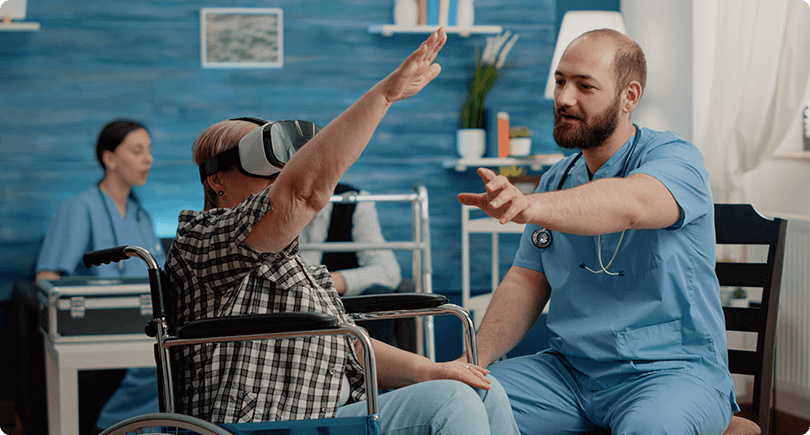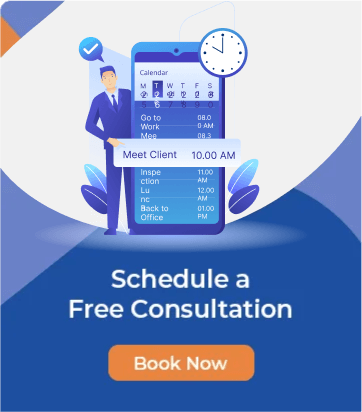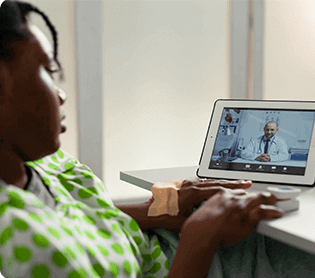Virtual Reality (VR) is no longer just a futuristic concept confined to gaming and entertainment; it has emerged as a powerful tool in the healthcare sector. Patient engagement has become a crucial factor in delivering effective care as the healthcare industry evolves. Engaged patients will likely adhere to treatment plans, understand their health conditions, and actively participate in healthcare decisions. Virtual Reality in healthcare is poised to revolutionize patient engagement solutions by providing immersive, interactive experiences that can transform how patients perceive and interact with their healthcare. In this blog, we will explore how custom VR healthcare solutions are reshaping patient engagement and the implications they hold for the future of healthcare.
VR in Healthcare

Virtual Reality in healthcare has made significant strides, offering innovative solutions that address clinical and non-clinical needs. Initially used for surgical training and simulation, VR systems for hospitals have expanded their reach to pain management, rehabilitation, mental health therapy, and patient education. Creating realistic, immersive environments and virtual reality healthcare solutions allows professionals to deliver personalized care, tailor treatment plans, and provide education in previously unimaginable ways.
For instance, VR has been used to simulate surgical procedures, allowing medical students and surgeons to practice in a risk-free environment. In pain management, custom VR healthcare solutions have been proven effective in distracting patients from pain, reducing the need for opioids, and significantly improving the overall patient experience. These applications demonstrate VR’s potential to enhance clinical outcomes and significantly improve patient engagement.
Role of Virtual Reality in Patient Engagement

Patient engagement empowers patients to take an active role in their healthcare journey. VR healthcare app development offers a unique platform for achieving this by making healthcare experiences more interactive and accessible. Traditional patient education methods, such as brochures and verbal instructions, must fully engage patients. Virtual reality healthcare services, on the other hand, can immerse patients in a virtual environment where they can visualize and understand their conditions, treatment options, and potential outcomes in an engaging and informative way.
For example, a patient undergoing surgery can use VR medical software to take a virtual tour of the operating room, understand the procedure, and experience a walkthrough of the recovery process. This not only alleviates anxiety but also enhances the patient’s understanding and engagement in their care. VR software can also be used in rehabilitation, where patients can engage in interactive exercises that are both enjoyable and effective, significantly increasing adherence to therapy regimens and offering hope for improved patient outcomes.
Applications of VR for Patient Engagement
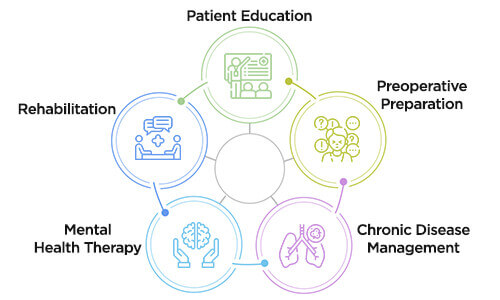
Virtual Reality offers a wide range of applications that can enhance patient engagement across different aspects of healthcare:
1. Patient Education
VR integration in healthcare can create immersive educational experiences that help patients better understand their diagnoses, treatment plans, and procedures. For instance, a patient diagnosed with cancer can explore a 3D model of how cancer affects the body and how different treatments work, leading to more informed decision-making.
2. Preoperative Preparation
By providing a virtual tour of the surgical process, VR therapy solutions can help patients understand what to expect, thereby reducing preoperative anxiety and improving postoperative outcomes.
3. Chronic Disease Management
Patients with chronic conditions, such as diabetes or COPD, can use VR to simulate lifestyle changes, such as diet and exercise, in a virtual environment. This interactive approach can make it easier for patients to adhere to recommended lifestyle modifications.
4. Mental Health Therapy
VR is being used to treat conditions such as anxiety, PTSD, and phobias by exposing patients to controlled virtual environments where they can safely confront and manage their fears. This immersive therapy is more effective than traditional methods for some patients.
5. Rehabilitation
In physical therapy software, VR can create engaging exercises that motivate patients to complete rehabilitation programs. Gamified VR experiences can make the often tedious virtual physical therapy process more enjoyable, leading to better adherence and outcomes.
Benefits of VR in Patient Engagement
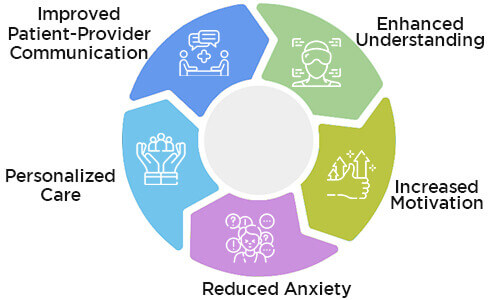
The integration of Virtual Reality in healthcare offers several benefits that can significantly enhance hospital management systems:
1. Enhanced Understanding
VR allows patients to visualize complex medical information in an easy-to-understand format. This can help them better comprehend their health conditions and treatment options, empowering them to make informed decisions.
2. Increased Motivation
By making healthcare experiences more interactive and enjoyable, VR can increase patient motivation to adhere to treatment plans, attend therapy sessions, and make necessary lifestyle changes.
3. Reduced Anxiety
VR can simulate healthcare environments and procedures, helping to reduce anxiety and fear associated with medical treatments. This can lead to a more positive patient experience and improved mental well-being.
4. Personalized Care
Healthcare VR consulting can be tailored to individual patient needs, providing personalized education, therapy, and rehabilitation experiences that cater to each patient’s unique circumstances.
5. Improved Patient-Provider Communication
Virtual Reality in healthcare can facilitate better communication between patients and healthcare providers by providing a common visual reference point. This can lead to more productive discussions and a deeper understanding of treatment plans.
Future Trends and Innovations
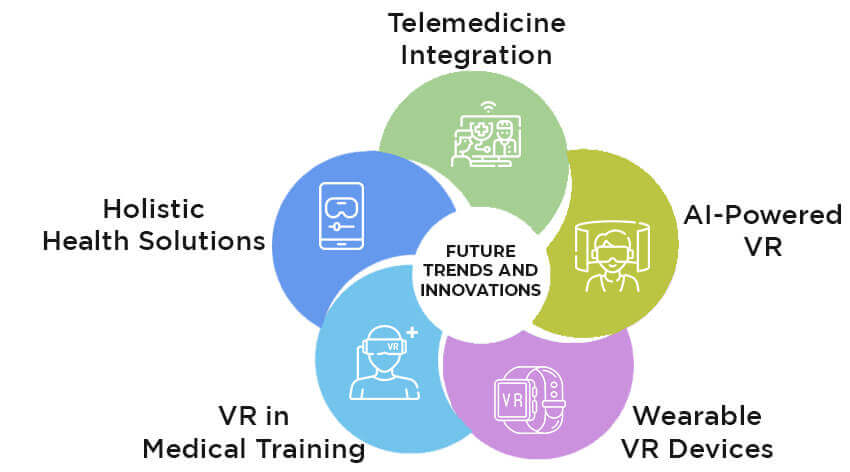
As technology advances, VR’s potential applications in healthcare are expected to grow. Future trends in VR tools for patient engagement may include:
1. Telemedicine Integration
VR could be integrated with telemedicine platforms to provide remote patient monitoring with immersive healthcare experiences, making virtual consultations more interactive and practical.
2. AI-Powered VR
Combining virtual reality systems in healthcare with artificial intelligence (AI) could lead to more personalized and adaptive patient experiences. AI algorithms could analyze patient data and adjust VR environments in real-time to meet individual needs.
3. Wearable VR Devices
The development of wearable VR devices could make VR more accessible to patients, allowing them to engage in immersive healthcare experiences from their homes.
4. VR in Medical Training
VR technology in healthcare and medical education, as well as training, will likely expand, providing healthcare professionals with more realistic and hands-on training opportunities.
5. Holistic Health Solutions
Healthcare VR app development services may focus on providing holistic health solutions that integrate physical, mental, and emotional well-being, offering patients a comprehensive approach to healthcare.
End Thoughts
Virtual Reality in healthcare is set to revolutionize patient engagement by providing immersive, interactive experiences that empower patients to take control of their healthcare journeys. As the technology in healthcare software development continues to evolve, VR’s potential to enhance patient understanding, motivation, and overall experience is vast. Healthcare providers embracing VR applications will improve patient engagement and create more personalized, effective, and patient-centered care. The future of patient engagement is here, and it is virtual.
OSP is a trusted healthcare software development company that delivers bespoke solutions as per your business needs. Connect with us to hire the best talents in the industry to build enterprise-grade software.

How can we help?
Fill out the short form below or call us at (888) 846-5382
Discuss Your Project Handover with a team of expert Book a free consultation arrow_forward
About Author

Written by Riken Shah linkedin
Riken's work motto is to help healthcare providers use technological advancements to make healthcare easily accessible to all stakeholders, from providers to patients. Under his leadership and guidance, OSP Labs has successfully developed over 600 customized software solutions for 200+ healthcare clients across continents.







